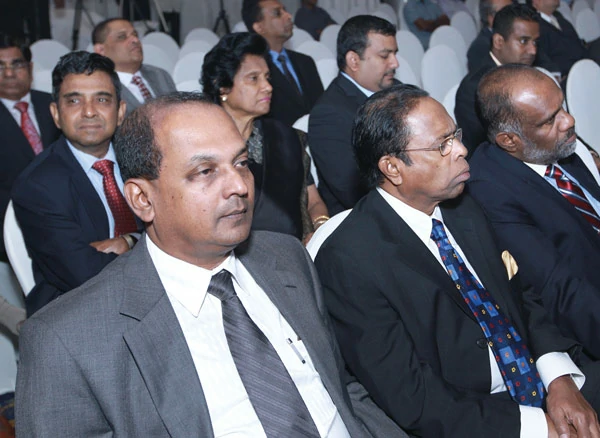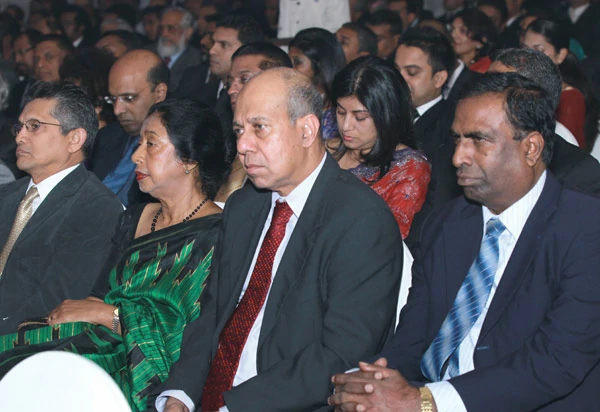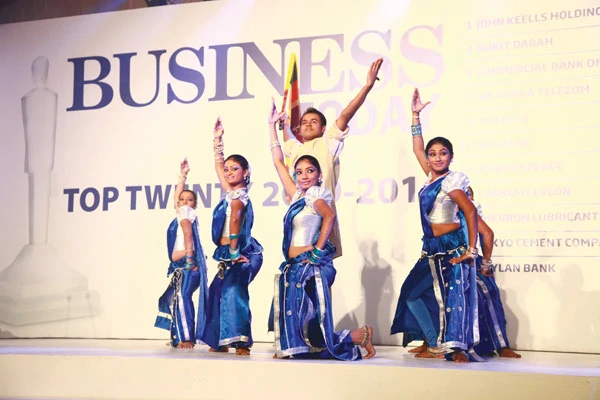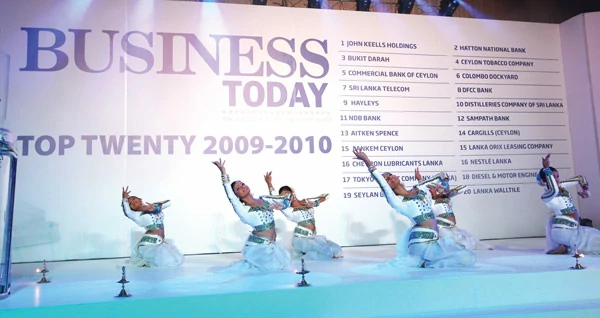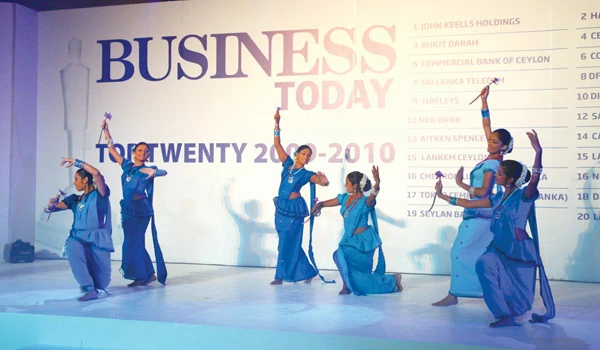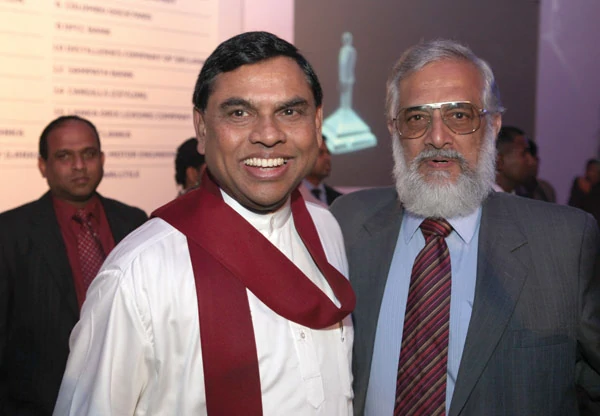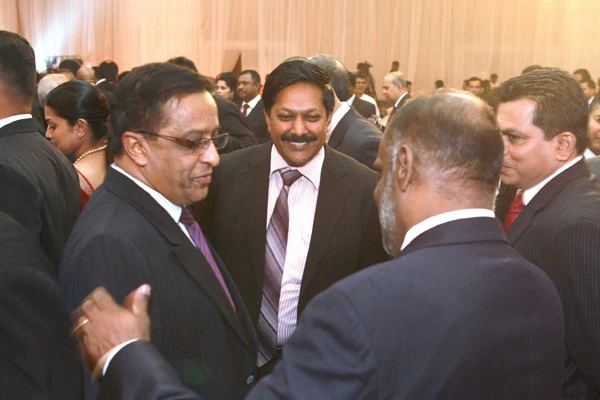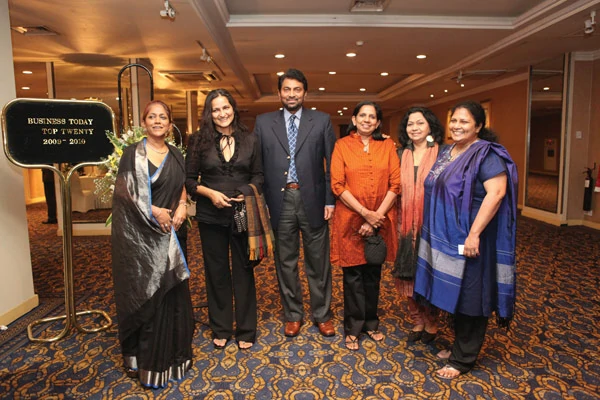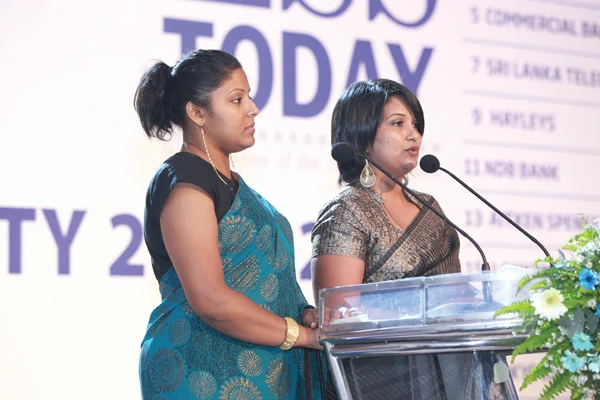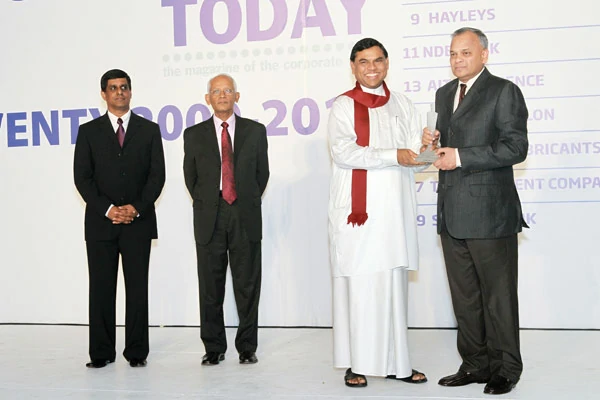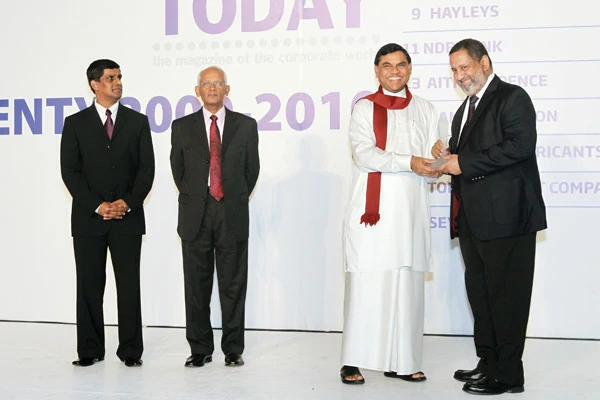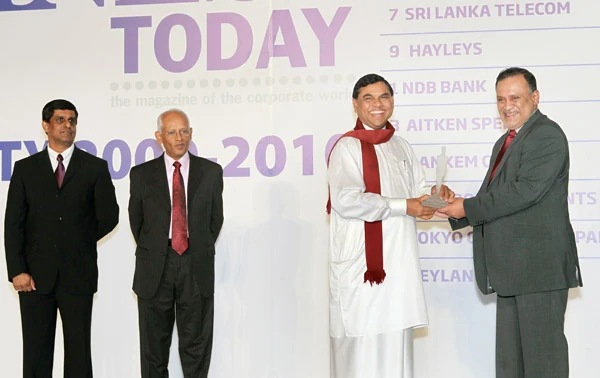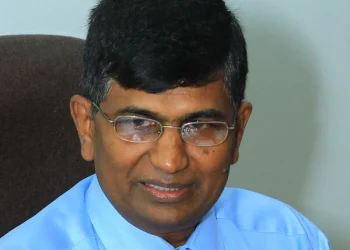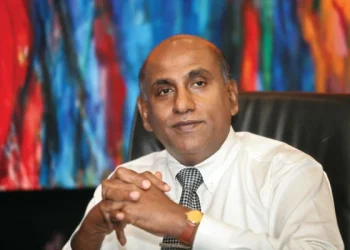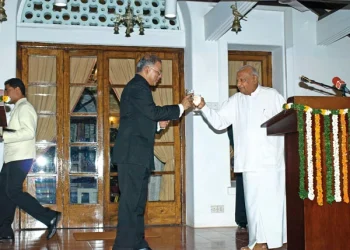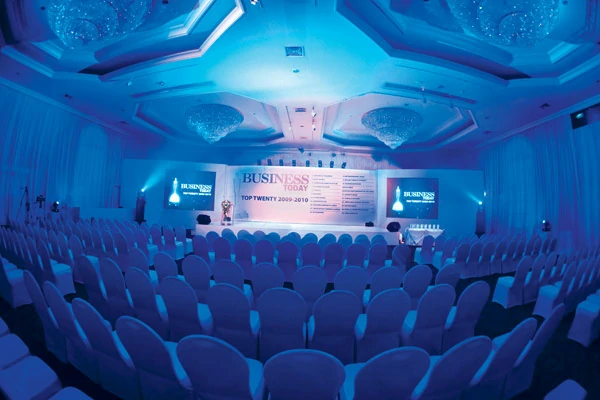
The Business Today TOP TWENTY recognised the excellence in corporate Sri Lanka during the financial year 2009-2010 and is the first ranking to be held during post war time. The Business Today TOP TWENTY awards ceremony was held on January 13, 2011 in the presence of Chief Guest, Basil Rajapaksa, Minister of Economic Development. The Guest Speaker for the evening was Secretary to the President Lalith Weeratunga.
The event and media coordination was by Glenda Parthipan of Emphasis.
This included the entertainment and attire of the dance troupe for the evening.
BT Options Continues To Support Those Who Are Positive About The Country

Business Today, since 1998 has annually recognised the top corporate performers in Sri Lanka who have strengthened the economy during challenging times. With the end of the conflict in May 2009, the enabling environment for business improved significantly with political and economic stability giving confidence to the private sector. Since the launch of the Business Today TOP 10, it is the first time that the top performers of corporate Sri Lanka are chosen in a period falling within post-war time. Though it may be premature to measure post war performance of the corporate sector, the initial signs thus far show promise and it would be interesting to see how future top performers will evolve to occupy positions among the best. Therefore with the view of mapping the near and long term business landscape and towards encouraging worthy prospects and contenders Business Today honours not the TOP 10 but the TOP TWENTY companies that have performed with vigour, strengthening the post war economy for the financial year 2009-2010.
On this occasion we are pleased to welcome the Sanghanayake of the Western Province and Chief Incumbent of Gangaramaya Temple, Venerable Galaboda Gnanissara Thero, Venerable Kirinde Assaji Thero, Venerable Uduwe Dhammaloka Thero and Venerable Viyapaththugama Revatha Thero, our honoured Chief guest for the evening, Minister of Economic Development, Honourable Basil Rajapaksa our distinguished Guest Speaker for the evening, Secretary to the President, Mr Lalith Weeratunga and Mrs Weeratunga, Attorney General Mohan Peiris, honourable Ministers, Commander of the Army and Former Commander of the Navy and members of the Armed Forces, Members of Parliament, Members of the Opposition, foreign dignitaries, Government Officials, leaders and members of the business community. The future of Sri Lanka are gathered here today. We thank you for taking time off your busy schedules to be with us on this special occasion. We apologise for any short comings in protocol.
An article titled ‘President Rajapaksa’s strengths and limitations’ written by Victor Ivan states, quote “Among the individuals who were close to President Mahinda Rajapksa, his brothers in the family, Gotabaya and Basil showed immense dedication and performed a number of tasks. They were an asset to the government and not a liability. Though Mahinda’s relationship as a brother imparted strength to them, they had a special aptitude and ability towards work.” Unquote.
Business Today has experienced this ‘special aptitude and ability towards work’ first hand. Minister Basil Rajapaksa knows no day, night nor holiday, he works tirelessly to achieve each task and he makes others work with the same vigour. If you ask the Minister any facts or figures, his ability to reply immediately is indeed inspiring. Minister Basil Rajapaksa as the head of the Ministry of Economic Development carries immense responsibility on his shoulders. We are honoured that Minister Basil Rajapaksa was able to grace this occasion as our Chief Guest and we wish to thank Minister Rajapaksa for being here with us today.
Looking back at the past year, we BT Options have achieved much. Explore Sri Lanka, which began in 1987 will be celebrating 25 years and can proudly claim to be the only magazine to be published uninterrupted for the duration of its existence. The publication began under the leadership of Richard Tuttle and Rakesh Wadwa who operated casinos in Sri Lanka at the then Meridian rooftop in the 1980s and early 1990s. With the closure of casinos in the 1990s, the ownership of the company was acquired by Mathi K Parthipan who since then is the sole owner and shares are held by Mathi and his staff. We take this opportunity to thank Shalini Wadwa for guiding and advising us through our journey as we go from strength to strength. The company has grown significantly and is now publishing six magazines; Explore Sri Lanka, Business Today, Target, Serendib, the inflight magazine of SriLankan Airlines, The Architect and Vaasthu, the English and Sinhala journals of the Sri Lanka institute of Architects. The business model of Serendib and The Architect is one where the magazines are fully funded by BT Options and subsequently the profits are shared on a percentage basis. Many assume that Serendib came to us due to political influence, however this would not have been possible had we not proven ourselves competent and capable from our own publications. It is the first time in the history of the National Carrier that the production and printing of Serendib has been done completely in Sri Lanka. The introduction of Sinhala and Tamil articles, again for the first time ever in Serendib has been well received from all sections of society and has instilled pride in all. At this moment we would like to take this opportunity to thank, Podi Hamuduruwo, Mr Lalith Weeratunga, Dr P B Jayasundera, Chairman of SriLankan Airlines Mr Nishantha Wickremasinghe and CEO of SriLankan Mr Manoj Gunawardena for their continuous support and encouragement and also Minister Wimal Weeranwansa who supported us while he was an MP.
We have always looked at the positive side of Sri Lanka and therefore we work with everyone who looks at the country positively. We work with various political parties and politicians without accepting any monetary gain. As you can see, politicians from various parties are seated here today. We continue to give our support to those who have the best interests of the country at heart.
Some categorise us as a media organisation, but we are not a media company, BT Options is a private company working for profit where publishing is one aspect of our business.
An Article Titled ‘President Rajapaksa’s Strengths And Limitations’ Written By Victor Ivan States, “Among The Individuals Who Were Close To President Mahinda Rajapksa, His Brothers In The Family, Gotabaya And Basil Showed Immense Dedication And Performed A Number Of Tasks. They Were An Asset To The Government And Not A Liability. Though Mahinda’s Relationship As A Brother Imparted Strength To Them, They Had A Special Aptitude And Ability Towards Work.”
We recognised the importance of moving with new technology while valuing our traditions. All our magazines come in print form but we are also now on Zinio – the portal for digital books and magazines. We are taking Sri Lanka to the world. Business Today has reached far and wide, just go on to google.com and type the words business today and you will see for yourself. Explore Sri Lanka, Business Today, Serendib and The Architect are all available on Zinio. Business Today features the monthly column by Richard Branson and also articles penned by President Barak Obama and Vice President Joe Biden Jr.
There are many who are not aware of the major development projects completed and on going around the country since President Mahinda Rajapaksa began his term in 2005, therefore in commemoration of President Mahinda Rajapaksa beginning his second term in November 2010, BT Options produced the coffee table book – Sri Lanka the Emerging Wonder of Asia. From concept to design to production all were done by us, BT Options. All aspects of the book was fully funded by BT Options. The book highlighted the various development projects that were carried out throughout the country during the first term of President Mahinda Rajapaksa. Many who saw the book were surprised by what they saw ; they were not aware that such massive scale projects were taking place in the country and were amazed to see them in the coffee table book.
One and a half years have passed since the end of the conflict, we see the Government taking all measures and providing incentives and opportunities for the private sector to perform but we are yet to see the private sector really taking the top gear and drive the economy. It is thanks to the timely action, dedication and sacrifice of the Armed Forces guided by the Defence Secretary Gotabaya Rajapaksa and the fearless leadership of President Mahinda Rajapaksa in safe guarding the territorial integrity of the country that we are seated here today. We wish to thank the personnel of the Army, Navy, Air Force, Police and Military Intelligence that played a significant role in creating an environment of peace and freedom that is conducive for competitive business and economic growth.
To quote President Mahinda Rajapaksa from his speech given at the Parliament on May 19, 2009 following the victory over terrorism, quote “I value my motherland first, second and third. This should be so to you and to the entire nation. It is only our beloved motherland that we should all cherish and value.” Unquote.
We thank you for accepting our invitation and being present here in mutual recognition of the Business Today TOP TWENTY.
Address By Venerable Galaboda Gnanissara Thero
 Ven Galaboda Gnanissara Thero, the Sanganayaka of the Western Province and the Chief Incumbent of the Gangaramaya Temple, who is known to us as Podi Hamuduruwo has been a pillar of strength, guiding us through challenging times and encouraging us through good times to aim higher. Our background with Podi Hamuduruwo runs as far back as 1989. 22 years later Podi Hamuduruwo still sees us through good times and bad.
Ven Galaboda Gnanissara Thero, the Sanganayaka of the Western Province and the Chief Incumbent of the Gangaramaya Temple, who is known to us as Podi Hamuduruwo has been a pillar of strength, guiding us through challenging times and encouraging us through good times to aim higher. Our background with Podi Hamuduruwo runs as far back as 1989. 22 years later Podi Hamuduruwo still sees us through good times and bad.
Podi Hamuduruwo is a visionary, a monk with a clear purpose. Hailing from a line of Buddhist priests who have been pivotal to the revival of the Sri Lankan nation, Podi Hamuduruwo continues the work of his predecessors with an identity of his own. Race, religion, caste or creed is immaterial to Podi Hamuduruwo and this he has shown through action. The thero lives his life on the Buddhist teaching of the past is the past, the future is tomorrow, but the present is today.
We bow our heads in respect to Podi Hamuduruwo for being our mentor and staunch supporter through difficult times.
Ven Maha Sangha, Hon Basil Rajapaksa, Attorney General, Minister of Education, Secretary to the President, Mr Lalith Weeratunga and Mrs Weeratunga, Chairmen representing TOP TWENTY, private sector corporates working with dedication and commitment to develop the country, Company Directors, ladies and gentlemen of those corporates and guests,
The details about how Mr and Mrs Mathi Parthipan established new business in this country were mentioned. He is an honest, simple and a courageous man who works with sincerity and has a good understanding of the teachings of the Buddha including fortune-misfortune, credit – discredit and criticism – praise, as such he had the strength to engage in publishing for a long time. Firstly, we must thank him, for this endeavour, which he started, with the intention of providing a great service to this country, without obtaining any profit or help from these corporates. Today, the ten corporates, has transformed into 20. We constantly reminded him, not 20, this number should go to 34, because there is a belief in this world that number seven is a good number.
However, there is one point that must be noted. We must firstly be thankful that he is making this determined endeavour, introducing the corporate sector to the country, creating an occasion of esteem for them and recognising those who extend a helping hand towards the development of this country. I remember that His Excellency the President always gave his support for this venture. He has participated in all these occasions. Previously, Defence Secretary Mr Gotabaya Rajapaksa attended the ceremony and this year, it’s Minister Basil Rajapaksa who is here at this ceremony showing his support for this awards ceremony. Likewise, supporting those who work towards the development of the country is a worthy deed.
Today, I am very happy to say, that under an appeal made by me, previously when it was the ten companies, they provided bicycles to school going children in Hon President’s area in Hambantota. This inspired and motivated the children. Today it is a period where weather conditions have changed in this country and around the world. Now I think in our country, we might not need air conditioners in the future. We do not know if it will be for the better or worse. However, philosophers have spoken of these changes in the world, Lord Buddha in particular has spoken about it, the uncertainty, the changes, the transformations.
Those In The Corporate Sector Must Share And Uplift The Innocent People, The Common People. You Have The Responsibility Of Making This A Rich And Prosperous Country.
I make an appeal today to this corporate sector. There are a large number people in this country, capable people, business people, powerful people who have become helpless and been displaced due to the floods, they are faced with difficulties. It is not only in our country, a lot of countries in the world have been affected by this. Therefore, in this speech, I make one appeal. The Hon Presiden t has gone to Polonnaruwa and met with those displaced people; provide these people, not money, but dry rations, mats, pillows, nets, this is a good opportunity to provide such items to them. To help people in times of need is also an important deed.
Hon Minister, one of the major problems for the corporate sector in this country is the date cheque, now you cannot even say date cheque because the cheque expires within six months. Therefore, now they call it open cheque. Corporates have faced difficulties because of this loan system. Consumers have also faced difficulties. I also address the Secretary to the President who is here, that to earn their wealth these businessmen also collect interest. When adding this, many forget that an extra burden also falls on the common people.
Therefore, a transaction that happened in a week or two those days, today takes six months, and after six months, the open cheque concept has come about. This is a very dangerous thing. It is a major loss for this country’s development. You have a way to stop this. When approaching it from the governance of the country, this will positively affect the common people of the country. The reason for this is that it is the common people who spend money day by day and buy goods. Even this tourism sector, we hear, that certain tourism companies, delay payments to smaller tourism businesses, but when tourists come to the country, they pay money months ahead. Sharing profits is a good habit that was prevalent in our past. One didn’t serve a plate of rice only for one’s self.
In hotels, they have made the plates quite large, because they serve moreso that it spills on the carpets on the ground. I was told that in the Hilton Hotel, they have made the plate bigger and heavier. However, in those days, people in our country used to serve a rice plate, and hand it to the next person. Similarly, those in the corporate sector must share and uplift the innocent people, the common people. You have the responsibility of making this a rich and prosperous country. The time has come to engage in such deeds. Furthermore acknowledging the work done by the Hon President through great dedication and sacrifice and wishing you all good fortune, I wish Mr and Mrs Mathi Parthipan protection, with the belief in their strength to further develop their business and continue this service, I conclude my speech.
Keith Bernard, Business Today TOP TWENTY Analyst

Ven Galaboda Gnanissara Thero and other respectful members of the clergy, Chief Guest Hon Basil Rajapaksa, Minister of Economic Development, Mrs Rajapaksa, Special Guest Mr Lalith Weeratunga, Secretary to the President, Chairman and Managing Director of BT Options, Mr Mathi Parthipan, Hon Ministers and Members of Parliament, foreign dignitaries, heads of the public and private sectors, officers of the Armed Forces, distinguished invitees, ladies and gentlemen,
We Would Fall Short Of Our Endeavours, Had We Not Provided At Least Some Fertile Ground To Recognise Or To Raise The Scale Of The Excellence Of Our Companies, And The Performances Of The Blue Chip Companies In Sri Lanka.
Mathi, first of all thank you for extending the opportunity to speak at your flagship annual event. Standing here I feel humbled by the presence of so many distinguished personalities who really are the icons of the public and private sector and who hold the key to our great nation’s future. The occasion also reminds me of the origins of the Business Today TOP 10 back in 1997, when Mathi, Dinesh who I think is also here and myself, we three of us felt the need to recognise the TOP 10 business performers of Sri Lanka. We worked out the mechanism and got the process going rather quickly. Sure, there were challenges but the feedback was positive, overwhelming and it was encouraging.
Mathi, true to his nature and character as in most of the things that he does decided to host the annual TOP 10 event at his own expense without any sponsorships or external financial support and to date he has maintained that position. Mathi I know you will not want me to say this in public but your yeoman services must be acknowledged.
Dinesh of course, who was one of the core architects of the BT TOP 10 of course opted out when he joined the boards of two leading blue chip companies who have been regular features at the TOP 10 events. That also speaks for the ethics practiced by the TOP 10 team. But before leaving, Dinesh introduced Shiron Gunaratne, to the team and Shiron also spent another three or four years helping us in the whole process and extending his full support. And, after giving his support to the process, Shiron also joined a blue chip company as a Chief Financial Officer and that left just Mathi and me to continue what we started.
Fortunately of course for us in the last five years or so, we had engaged the professional services of KPMG Ford Roads who had been very supportive and of course who had been doing all the granular number crunching and analysis making our job that much more easier in selecting TOP 10. I think I should also acknowledge and appreciate the special efforts made by Suren Rajakariya, partner of KPGM Ford Roads for taking a special interest to advice and help us in selecting the TOP 10, which is now the TOP TWENTY.
A quick word on why we decided to expand the list to 20. The original intent obviously was to recognise the TOP 10 corporate performers in the hope that the captains of our private sector would strive to achieve higher excellence. I think that no doubt has been achieved. That is done, save a few exceptions and it became plainly apparent that the BT TOP 10 of late years, I suppose, in our experience, has turned out to become more like a game of musical chairs between a few. And of course, you must give credit to the companies that have been repeatedly performing and doing their best to make it to the list continuously. It’s difficult to enter the top 10 list or the 20 list as it is now. But, it is even harder to retain that position and you really have to do a lot to lead the pack in Sri Lanka and for that they should be congratulated.
But, we would fall short of our endeavours, had we not provided at least some fertile ground to recognise or to raise the scale of the excellence of our companies, and the performances of the blue chip companies in Sri Lanka. And due to that, in 2010 we decided to expand the list to 20 and due to similar scores achieved by at least two companies, the list we have emerged, that is 22 companies have emerged as the TOP TWENTY. I use the opportunity of course to congratulate the TOP TWENTY. They each have a fighting chance to improve their performance and our sincere hope is that this would lead to achieving greater heights of excellence by a vibrant private sector. That then serves as a cue for me to return to my seat and let you listen to those who we trust to unlock the potential of a great nation.
I thank you, and I hope you have a great evening.
Thank you.
Speech By Lalith Weeratunga, Secretary To The President
Our Guest Speaker for the evening was Secretary to the President Mr Lalith Weeratunga. Mr Weeratunga is also the Chairman of TRC and is the current Chair of the Information and Communication Technology (ICT) Committee of the Economic & Social Commission for Asia and the Pacific. Furthermore Mr Weeratunga was unanimously elected as the Chairman of the Commonwealth Telecommunications Organisation.
Having been in the Sri Lanka Administrative Services since 1977, Mr Weeratunga has diverse experience, which has enabled him to provide stable and solid leadership to the Public Service. Mr Weeratunga played a pivotal role in introducing ICT to all sections of the Government and society. With President Mahinda Rajapaksa envisioning Sri Lanka to become a knowledge hub, Mr Weeratunga’s work will undoubtedly be a stepping-stone towards ac hieving this aim.
We have worked very closely with Mr Weeratunga and greatly appreciate the personal interest he takes in the work we do. His advice and guidance has strengthened us and we would like to take this opportunity to thank him.
Ven Galaboda Gnanissara Nayaka Thero the Chief Incumbent of the Gangaramaya Viharaya, Ven Maha Sanga, Hon Basil Rajapaksa, Minister of Economic Development, Hon Mohan Pieris, the Attorney General, Commander of the Army and Former Commander of the Navy, Admiral Wasantha Karannagoda, distinguished industry captains, Members of Parliament, friends,
Let me first of all say how glad I am and how privileged I am to be able to address such an august gathering. In that connection let me thank my good friend Mathi for giving me this opportunity to share some thoughts on this momentous occasion. We are here to pay tribute to 20 leading companies that have reached excellence in business and corporate Sri Lanka. My congratulations to all the companies that have earned this coveted title and my best wishes to aspiring companies who I am sure will be bracing themselves for tough competition for a place in the next year’s awards from tonight onwards.
You heard, a couple of minutes ago the story of our being able to defeat terrorism, it is something we must celebrate and talk about. We ended 30 years of bloodshed and economic stagnation in May 2009 clearing the path for the private sector to engage in enterprise and investment. As very rightly stated by the compere, today we are here without any fear because terrorism has been eliminated from our land. That feat many thought was impossible. Sri Lankans as well as other nations did not believe that terrorism could be eliminated from our midst. But we did it. Let me thank the two distinguished members of the armed forces who are here for being involved and of course I must pay tribute not only to the great leader that Sri Lanka produced to take this tough stance against all odds, against all opposition, against foreign pressure, he is the country’s leader, but also Mr Gotabaya Rajapaksa who brought in great dimensions to defeat terrorism. The opportunity cost of the war against terrorism has been tremendous in all possible aspects. It becomes more apparent when we experience how in these past one and a half years of peace alone the business climate has improved remarkably, prompting Business Today no doubt to elevate its traditional top notch ten to 20 this year and give due recognition to the dynamism and competitiveness of the emerging corporate giants. I am encouraged to see several new companies making the list for the first time since Business Today introduced this ranking system in 1998. With a clear vision set for Sri Lanka by His Excellency the President, we can be hopeful that our future as well as the future of our children and grandchildren will enjoy life under the sun in a country that is soon to be the Wonder of Asia. You as representatives of the corporate sector have been a courageous companion in Sri Lanka’s journey during times of turmoil and now the Government has finally created an enabling environment for you to thrive in and help take this country forward in this post conflict period.
With A Clear Vision Set For Sri Lanka By His Excellency The President, We Can Be Hopeful That Our Future As Well As The Future Of Our Children And Grandchildren Will Enjoy Life Under The Sun In A Country That Is Soon To Be The Wonder Of Asia.
This government will continuously strive to create conducive conditions and employ useful instruments to facilitate the private sector in its growth. We were conferred the status of a middle income emerging market country by the IMF last year. For the first time in about 50 years, our economic growth rate has surpassed inflation. Not only have we to maintain this strength, but we are looking to increase the growth rate from the present eight percent to ten percent while curtailing inflation around five percent. The Hon Minister is here who is responsible for tourism and many other things as you saw in the clip that was shown just now. I just want to say, that we are in for good times. We surpassed 600,000 tourist arrivals in 2010. The tourism sector continues to show promising signs of exceeding expectations. Critical infrastructure is being provided as never before. Ports, highways, power facilities are being built at a rapid rate to facilitate and encourage investors. Private sector has the opportunity to tap into business in virtually every sector of our economy and they are already doing that, be it in agriculture, health, industry, latest is education, transport, banking or insurance. Interest rates have been reduced on private sector borrowings and more facilities are envisaged in the future. We expect that FDI and higher foreign financial inflows to the private sector will reach USD 1.5 billion and that more domestic funds will be available at competitive rates to engage in public sector development projects.
In World Bank’s Doing Business Index, we are currently placed at the 102nd slot. Our position has not changed in 2009 and 2010. But, we are making every effort and that can only be done with the help of the private sector to elevate this ranking to 30 by 2016. And that is also the year, my dear friends, Sri Lanka would achieve the IT literacy of 75 percent. That is the target set by His Excellency the President in his IT initiatives. I wish to commend the Central Bank’s efforts in assisting in this regard by publishing a step by step guide to doing business in Sri Lanka.
>One of the major areas for investment must be in man power skills development. The private sector has to tap the human resource available in the country for its own advancement. As I mentioned earlier, Sri Lanka is engaged in an upward trajectory of growth. The government is promoting regional hubs in the areas of naval, aviation, commercial, energy and knowledge. We can build infrastructure and introduce the latest technology, but what will be the most valuable resource will be sustaining the economic competitiveness of these assets. It, of course, has to be a competent, skilled workforce. They need to be competent and skilled not just in traditional fields, but to meet new requirements in our economy like information technology, nano technology, oil and gas technology, satellite technology and etc. In fact, the Mahinda Chinthana Vision for the Future pledges to make significant changes in the education structure to produce trained persons to meet the emerging challenges in both public and private sectors. Every year, approximately, 14,000 young people graduate from national universities in Sri Lanka. For some of them, stable employment is assured. For others, many factors influence in securing employment. Market demand, skill levels, personal initiatives and of course access to information. Traditionally, every year, more than 200,000 students leave school after advanced level, of whom, only about 20,000 manage to gain entry to national universities. Majority of the remaining students either seek job opportunities or seek vocational training of some sort. In that connection, I am so deeply privileged to have been associated with the Ven Podi Hamuduruwo, way back in the 1980s when he started his vocational training initiatives at Gangaramaya which trained thousands and thousands of young people to get into very productive employment opportunities.
This is of course a major responsibility of the Government, to ensure that our human resource is used productively not only for their individual benefit but also to advance the progress of this country as a whole. As in most other countries, the government as a single entity is the largest employment provider. The Government must find means and resources to enhance the effectiveness of not only the persons directly employed by it, but also the entire workforce through appropriate education and training. It is here that the private sector in Sri Lanka can play a major role. Many countries have realised that manpower and skills development cannot practically be the sole responsibility of the Government. Public private partnerships are therefore common in human resource development strategies in many countries. The private sector, especially the enterprises create the demand for jobs in industries. The industries in turn define the type of skill required. Here in Sri Lanka, we have to acknowledge that there is a mismatch between what is produced through the local educational and vocational training stream and what is required by the industry. The graduates who pass out every year find that they are not received with any great enthusiasm by the industrial sector due to their deficiencies in managerial and technical capabilities. We are going through post conflict development. If we consider the experience of post conflict regions the scope for industrial development in such countries is reliant on the ability of the labour force to acquire skills in the manufacturing sector. This may be applicable to us as well and we need to forecast and be prepared for the manpower needs of the future growth industries. But when it is realised that the supply is not readily available to meet this specific industry demands the enterprises themselves can take on skills development and job trainings of these people. The experience is that graduates who train through programmes run by the industry show higher employability, productivity and labour mobility than those trained through training institutions.
In Fact, The Mahinda Chinthana Vision For The Future Pledges To Make Significant Changes In The Education Structure To Produce Trained Persons To Meet The Emerging Challenges In Both Public And Private Sectors.
One of the areas identified for enhancing the skills of our workforces is to expand industry specific vocational training with continuous retraining and reskilling programmes. There can be many opportunities for the industry to collaborate with government vocational training programmes and create their own supply to the market. You can be involved with the vocational training institutions in Sri Lanka in planning programmes from the outset to meet the future growth of your business. Sri Lanka developed, as you would very well know, a well thought out apprenticeship scheme in the early 1970s. Modelled on the German skill system, our apprenticeship scheme did yeomen service to both the industry as well as young people who were keen to learn a trade or acquire a skill. From about year 2000 due to poor government industry collaboration as I feel the apprenticeship scheme seemed to have lost its original sheen. Fortunately for the youth of this country the present minister of youth affairs and skills development Hon Dullas Alahaperuma has understood this issue and is taking steps to remedy this situation. Another area of concern is the brain drain. Highly competent professionals, especially in science and engineering skills, have been leaving our shores, primarily because of the lack of opportunities in the innovation industries. We have internationally known NASA scientists and engineers who have made a mark in their countries of domicile. In fact, the State of the Economy Report for 2010 published by the Institute of Policy Studies discloses that Sri Lanka is only second to the Philippines on the extent of brain drain in this sector. It is not often that the Government can afford to pay high salaries to such deserving Sri Lankan professionals and retain them in this country, but the private sector can afford to attract them, retain them in this country and make use of their services for national development. I have spoken briefly thus far on how we as a government and you as a private sector can help this country flourish and forge ahead.
You are entrepreneurial leaders in Sri Lanka’s corporate world, with vast amounts of corporate experience and business acumen that has brought you to this status, to the level of winning highly acclaimed awards over the years. I am sure that your superior management skills have served you well in achieving the excellence that you have displayed so far.
I would like to divert your attention to a slightly different topic. An aspect of business practice. Just a few days ago I was browsing through this month’s issue of Business Today when I came across several pages of an article written by Sir Richard Branson, the British industrialist and the founder of the Virgin Group that had created an empire from airlines, record labels, mobile phones, digital publishing and even space travel. Richard Branson incidentally is one of the most influential entrepreneurial figures in the world known for his humanitarian work and his efforts at tackling global environmental problems. While on this thought I was reminded of an interesting article I came across in a journal some years ago on what is known as corporate philanthropy. The Ven Podi Hamuduruwo in fact brought about another aspect of philanthropy in these times of national need and I am sure you industry leaders who are compassionate, who can afford to help the unfortunate brethren of ours would come forward to help them at this point of time.
“Your Fortune Is Rolling Up, Rolling Up Like An Avalanche. You Must Distribute It Faster Than It Grows. If You Do Not, It Will Crush You And Your Children And Your Children’s Children.”
This corporate philanthropy dealt with one of the best known philanthropic organisations in the world the Rockefeller foundation. This foundation was started by John D Rockefeller, his son John D Rockefeller Jr and his business advisor Fedrick Teller Gates. John Rockefeller created one of the largest oil monopolies of his time and was in a position where he controlled 95% of the US oil market. He had not only vast control over oil drilling, refineries, prices and transportation, but he also sabotaged his competitors, spied on them and manipulated secret contracts. His business success was phenomenal. Certainly I am not asking you to do those stuff what Rockefeller said and did, but these are facts. His business success was phenomenal and his fortunes were expanding so rapidly that he could neither control nor protect them. Very interesting. Yet for all his wealth, he was one of the most hated men at the time for all the excesses in his rise to power. As an attempt to soften this perception, he was prompted to make a contribution towards the rebuilding of the University of Chicago. This is a well known fact. But, what defined him in later years as a well meaning philanthropist was the result of the partnership he built with his advisor Fredrick Gates.
The story goes to say that Gates grew frantic at the extent of Rockefeller’s financial holdings and said, let me quote, “your fortune is rolling up, rolling up like an avalanche. You must distribute it faster than it grows. If you do not, it will crush you and your children and your children’s children”, unquote. Gates was an influential impact on Rockefeller’s subsequent philanthropic work. He helped Rockefeller develop a system to ensure that his philanthropic donations were put to the best possible use. Philanthropist’s real potential it is argued was in his ability to identify and change the roots of social and economic skills, not its symptoms. Heinz, the other new philanthropist at the turn of the century developed on the idea of scientific giving and were able to act in a more organised fashion and tackle areas that could not be addressed by the government such as education, science, public health and agriculture. Rockefeller was encouraged to build universities and hundreds of schools and help disadvantaged groups in all parts of the country and finally to create the Rockefeller Foundation as a permanent corporate philanthropy in 1913 that reached many parts of the world. Although in terms of assets it has been surpassed by other organisations since then, it is the early legacy of the Rockefeller Foundation that still makes it an embodiment of modern corporate philanthropy.
That said, I am reminded of many other globally renowned philanthropic individuals like Bill Gates and Warren Buffett as well as leading philanthropic companies such as Microsoft, Johnson and Johnson etc which has made a difference to people in many parts of the world. Here in Sri Lanka, we too have philanthropic individuals, many, and organisations that make meaningful contributions to society. We, Sri Lankans as individuals are naturally philanthropic. In fact, the World Giving Index for 2010 had ranked Sri Lanka among the top ten charitable nations in the world, tied with Great Britain in the eighth place. It places us as the leading charitable nation in Asia. This ranking is based on a global survey by Gallup Research Company which measured the percentage of people who have given money to charity. The number of people who have given time to those less fortunate than themselves and those who helped a stranger. So there is an abundance of hope for this beautiful and smart island.
In relation to the philanthropic companies I spoke about earlier we see in the world a new trend, even amongst small and medium businesses to do good in society. We are more familiar with the management parlance for this, which is Corporate Social Responsibility, another way of describing corporate philanthropy I mentioned all this while. Whether it is out of self-interest or image building or sheer altruism, making charitable donations or engaging in initiatives to help the lot of the disadvantaged people has become part of worldwide business strategy for reputation management, and competitiveness. However, the positive side is that this kind of strategy is almost always a win-win situation for the company as well as the beneficiaries as well as other stakeholders such as the government which during competing demand is not always able to utilise resources where they are needed.
So you, as corporate bodies, industry captains, entrepreneurial leaders, innovative thinkers interested in creating this win-win situation, if you permit me to say this, ponder over these few questions. How will my company help to advance the interest of my community or disadvantaged groups? How will my company gain by such an intervention? What is in there for me? Will I gain greater acceptance among my customers due to my projection as a business that cares? How can I ensure that my company’s actions are taken as genuine by my customers and the community, and not merely as a budgetary requirement, which is not sustainable in the long run. Some of you who are involved in CSR projects in Sri Lanka will know how effective it is to properly communicate and market what you are doing to the public. Let’s put it this way. You fulfill your own objectives and the community is better off for it.
Before I conclude, please permit me to quote from His Excellency the President, when he presented the Mahinda Chinthana Vision for the Future, a New Sri Lanka, a Brighter Future. I think all what we have said, all what we stand for, all what we have hoped, is summed up in these beautiful three or four verses.
‘To win the world, develop the country, to develop the country, strengthen the village, to strengthen the village, protect the family, to protect the family, care for the person. By blending your thoughts, Mahinda Chinthana was developed. By drawing on your courage, we fulfilled your aspirations. I promised you a free nation, I promised you sustainable development, I assured you a better society, I assured you a land of plenty. I delivered. The children of Mother Lanka, Sinhala, Tamil, Muslim, Malay, Burgher, look to us with hope, to be their trustee, to be the one to realise their dreams. Now, I present to you our vision for a brighter future. Together, we will make the journey with your trust. I will deliver.”
It’s a very personal remark that I want to make, the man who made most of this possible, in fact the architect, the person who made this possible and was the livewire behind all this, is none other than our Chief Guest. He helped His Excellency the President not only during the war, but today as Chief Guest, I am very happy to see you here, Hon Minister. You have helped him in development work that is now the priority of this country. And let me at the beginning of this year, 2011, wish you the very best, all of us hope for a brighter future, not only for us but our children and our children’s children.
Thank you very much.
Chief Guest, Basil Rajapaksa, Minister Of Economic Development
A person who is calm amidst the storm, diligent and persevering, hardworking, a meticulous planner and master strategist but most of all a humble human – that is Minister Basil Rajapaksa. He recognises those who are genuine and work tirelessly as he. Having worked very closely with Minister Rajapaksa we have clearly seen that he works towards the upliftment of all communities regardless of race, caste, religion, gender or creed. There are no barriers.
As the Minister of the powerful Ministry of Economic Development much responsibility lies on his shoulders. From rural empowerment to tourism and investment, all aspects come under the purview of the Minister. With the end of the conflict there is an expected boom from these areas of the economy. Minister Rajapaksa is actively engaged in promoting tourism, investment and economic development in the country. He has always focused on remaining true to our roots, our identity where the country’s natural resources, heritage and culture are taken to the world. Much has been achieved in all spheres, especially in rural empowerment thereby reducing poverty from 15 percent to 7.6 percent in 2010. Minister Rajapaksa takes personal interest in all aspects and constantly provides encouragement to those who contribute to development of the country.
Minister Basil Rajapaksa is a strength to our nation and we are extremely proud that he was our Chief Guest on this special occassion.
